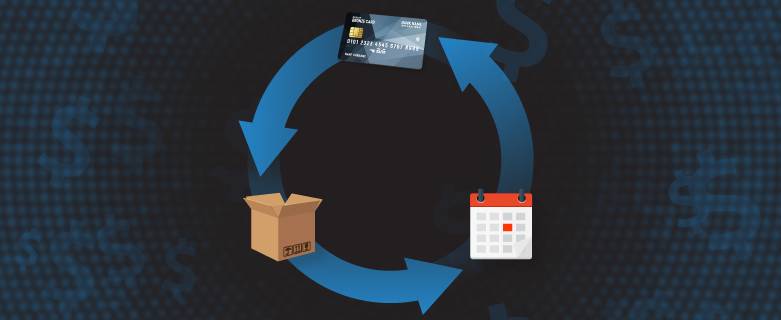
How to Prevent Subscription Billing Model Chargebacks
By Chris Alarie on Sep 2, 2020
The first subscription-based businesses were instituted by merchants selling books and periodicals in the 17th century. And while business and payment models have changed and evolved, some forms of business built around recurring payments and regular service continue into the 21st century. For modern merchants, this ancient business model can be both beneficial and potentially risky.
What is Subscription Billing?
As can be inferred from its name, subscription billing is a business model whereby consumers are automatically charged regularly in exchange for subscribing to an ongoing product or service.
As a billing model, subscription billing provides advantages for businesses and consumers alike. Consumers get regular access to goods and services, a convenient billing procedure, and often reduced prices compared to if the same goods were regularly purchased individually. Businesses get a reliable revenue stream and a potentially stronger, more consistent relationship with their customer base.
Of course, this billing model has potential drawbacks, as well. Because consumers generally do not have to take any additional action to provide payment after setting up their subscription, they can often forget about the subscription. This memory lapse can lead to circumstances where a consumer sees a subscription billed on their credit card or bank statement, has entirely forgotten that they had signed up for it, and contacts their bank to file a chargeback. It could easily be an innocent mistake on the part of the consumer, but the merchant, who has been left out of the process entirely, still suffers the consequences of the chargeback request as a result.
Subscription Billing is High Risk for Chargebacks
Another drawback of subscription billing is that it has a potentially high risk for chargebacks. These risks include innocent mistakes, such as the hypothetical circumstances described above. But there are also risks of chargebacks that arise from less honest circumstances.
Potential bad actors could strategically request a chargeback as a form of digital shoplifting, perhaps by continuing to collect the goods or services of the subscription during the interim between filing for the chargeback and receiving their refund. Or they could use it as a means of acquiring a free trial or “starter pack” with no intention of ever paying for the full service.
There are also possibilities for grey areas where the delivery of the service and the timing of regular billing are asynchronous in such a way as to lead a consumer to request a chargeback.
How to Prevent Recurring Billing Disputes
A solid plan for preventing frequent chargebacks from subscription billing necessitates being able to anticipate and preclude everything from innocent mistakes to intentional fraud and all of the shades of grey in between. While no merchant can prevent every confused customer or stop every bad actor, there are a number of best practices that will put you in a better position to reduce the number of chargeback requests you receive on your subscription billing accounts.
One of the most important practices is to be communicative with your consumers regularly. Make sure that you set clear expectations at the outset of the consumer enrolling in your service. Make sure they know what to expect, both in terms of services/goods provided and billing procedures.
If you make any changes or adjustments to your service deliveries or billing procedures, be sure that your consumers are aware of it. This includes clearly communicating the terms and length of a free trial if you offer one. It is in your best interest to disclose all fees, including termination fees.
It is also a good idea to make it easy for consumers to contact you if you have any questions. Make your customer service contact information available in as many places as possible.
Also, be clear about the procedures for opting out. A cancellation processed through your standard procedures is always better than a chargeback. Always process any cancellation requests as promptly as you can.
It is also essential to protect yourself. Ensure that you make sure consumers read and agree to all of your terms and conditions before you bill them or send the first installment of your service.
Be sure to use whatever sorts of anti-fraud tools may be available to you, such as address verification and geolocation tools. Account updating tools can also help preclude situations that may lead to chargebacks, such as customers moving or canceling their credit card or bank account without telling you.
New Regulations Could Help
Credit card networks have implemented changes that could protect merchants who receive chargeback requests on subscription billing accounts. For example, consumers generally have only 120 days from the transaction’s initial date to request a chargeback.
Visa is also instituting regulations that specifically apply to recurring transactions in which the merchant offers a free trial or introductory service as part of an ongoing, subscription-based service. To take advantage of Visa’s expanded chargeback dispute rights, the merchant must meet the following conditions:
-
Acquire the express consent of the consumer
-
Make a copy of the terms and conditions available to the subscriber at the time of subscription
-
Provide more detailed transaction receipts
-
Clearly label the charge as a “Free Trial” on billing statements
-
Simplify cancelations procedures
How to Dispute Recurring Chargebacks
It is possible to dispute a chargeback on a subscription billing account. However, to do so, the merchant must meet certain conditions set by the cardholder.
For MasterCard, the conditions that a merchant would need to meet to dispute such a chargeback successfully are as follows:
-
The transaction was not, in fact, part of a subscription billing plan but rather something like an installment billing plan. The merchant must provide evidence for this sort of claim.
-
The subscriber did properly cancel their account according to the terms and conditions of a signed contract.
-
The services or goods were provided after the cancelation date. Again, the merchant must provide evidence.
-
The cardholder agreed to terms and conditions that otherwise preclude a chargeback request.
For Visa, the conditions that a merchant must meet to dispute a recurring payment chargeback are as follows:
-
The merchant can prove that the account was not, in fact, canceled and has documentation to prove this.
-
Neither the merchant nor the acquiring bank were informed that the account was canceled. The merchant must provide evidence for this sort of claim.
-
The merchant can provide evidence that there had been no previous chargebacks on the account. This requirement is not relevant in Europe.
-
The services or goods were provided after the cancelation date. Again, the merchant must provide evidence.
-
The cardholder agreed to terms and conditions that otherwise preclude a chargeback request.
Can Subscription Billing Chargebacks Be Prevented?
Subscription billing plans can be beneficial for you and your customers, but, as above, come with several pitfalls. But, with a good strategy and the right tools, many of these chargebacks can be prevented.
MidMetrics can help. Our platform offers you real-time visibility into what’s going on with your chargeback activity and a way to measure how well your chargeback prevention solutions are working. You’ll know your chargeback prevention strategy is working when your chargeback rate is going down, and your Merchant ID Numbers (MIDs) are clear of any dangerous thresholds.
We offer a full suite of chargeback management tools, including Management Dashboards, In-Depth Analytics Tools, and On-Demand Reports.
MidMetrics is expertly designed to be easy to use, and it requires minimal IT effort for merchants to implement. It integrates with payment processors, gateways, CRMs, and service providers via API, and uses secure credentials to establish direct connections with card networks and banks.
Want to see MidMetrics in action? Book a demo with one of our chargeback specialists today.
Putting together a chargeback prevention strategy that affords sufficient protection can be daunting, as many different issues can lead to chargebacks. Not sure where to begin? We've got answers for you in this helpful guide, Chargeback Prevention: A Recipe for Healthy Merchant Accounts.
Frequently Asked Questions
Are there specific regulations relating to subscription billing?
Yes. As discussed in this article from MacMurray & Shuster, multiple states have auto-renewal laws (ARLs) in place that regulate certain aspects of subscription billing practices. The Federal Trade Commission (FTC) also has some rules in place relating to ARLs.



